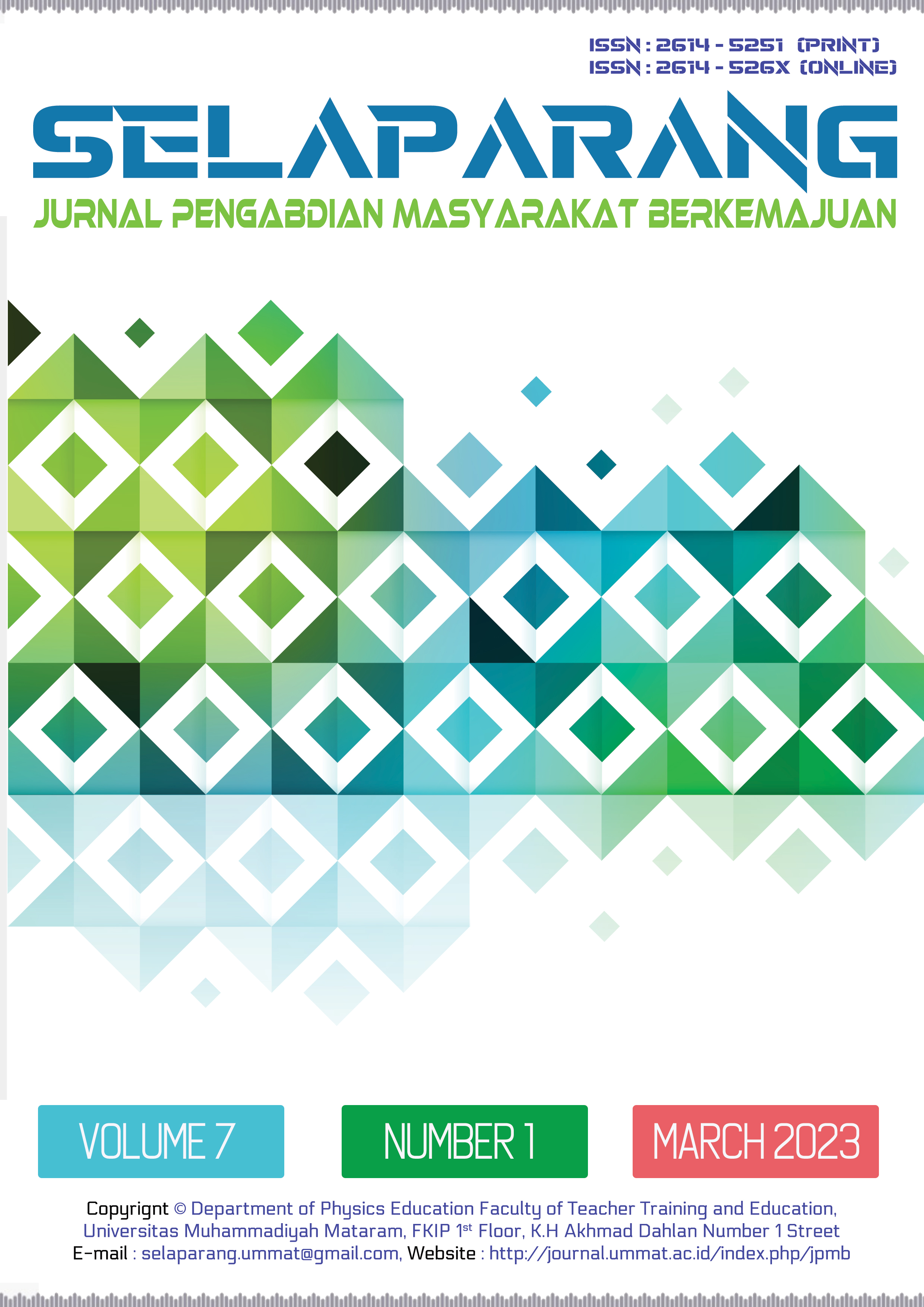PENGEMBANGAN RANTING MUHAMMADIYAH TAMANTIRTO SELATAN DAN USAHA MIKRO JAMAAH DENGAN PENUMBUHAN EKOSISTEM EKONOMI RANTING
DOI:
https://doi.org/10.31764/jpmb.v7i1.13743Keywords:
muhammadiyah branch, micro enterprises, economic ecosystems, religious study group, entrepreneurs.Abstract
ABSTRAK
Ranting MuhammadiyahTamantirto Selatan dihadapkan pada dua kondisi ekonomi yang mesti diatasi. Di satu sisi ranting membutuhkan cashflow untuk operasional kegiatan, di lain sisi banyak jamaahnya yang terbatas secara ekonomi dan terdampak pendapatannya oleh pandemi covid-19. Pengabdian masyarakat ini bertujuan untuk mengembangkan usaha mikro jamaah, pada saat yang sama juga meningkatkan kontribusi jamaah kepada ranting Muhammadiyah Tamantirto Selatan. Untuk pengembangan ranting dan usaha mikro jamaah, pengabdian masyarakat dilaksanakan dengan menumbuhkan ekosistem ekonomi ranting. Ekosistem ini berupa keterlibatan ranting dan jamaah pada pemilihan usaha mikro dampingan, identifikasi kebutuhan, pemenuhan kebutuhan usaha, akses dana kepada AUM yang mapan, pendampingan dan konsultasi wirausaha, sosialisasi pada seluruh jamaah pengajian untuk mensupport, pelaksanaan pengembangan bisnis oleh usaha mikro dampingan dan infak hasil usaha untuk ranting. Hasil kegiatan menunjukkan keempat usaha mikro yang didampingi mengalami kemajuan usaha dari segi omset dibanding sebelum pendampingan. Adanya program ini membuat keempat mitra dampingan tersebut menjadi rutin berinfak di celengan yang disediakan ranting. Pengabdian masyarakat ini memiliki kebaruan berupa pengembangan berbasis ekosistem.
Â
Kata kunci: ranting muhammadiyah; usaha mikro; ekosistem ekonomi; jamaah pengajian, wirausaha.
Â
ABSTRACT
The Tamantirto Selatan Muhammadiyah Branch faced two economic conditions that must be overcome: the need for operational cashflow and limited income of their congregation members due to the COVID-19 pandemic impact. This community service aims to develop the congregation's micro-enterprise, at the same time increasing the congregation's contribution to the South Tamantirto Muhammadiyah branch. For the development of branches and micro-businesses of the congregation, community service is carried out by growing the economic ecosystem of the branches. This ecosystem is in the form of involvement of branches and congregations in the selection of assisted micro-enterprises, identification of needs, fulfillment of business needs, access to funds to established AUM, entrepreneurial assistance and consultation, socialization to all congregations for support, implementation of business development by assisted micro-enterprises and infaq results. effort for twigs. The results of the activity show that the four micro-enterprises that were mentored experienced business progress in terms of sales compared to before the mentoring. The existence of this program has made the assisted partners donate in the donation box provided by the Muhammadiyah branch. This community service has a novelty in the form of ecosystem-based development.
Â
Keywords: muhammadiyah branch; micro enterprises; economic ecosystems; religious study group, entrepreneurs.
References
Andika, M., & Madjid, I. (2012). Analisis Pengaruh Sikap, Norma Subjektif dan Efikasi Diri Terhadap Intensi Berwirausaha pada Mahasiswa Fakultas Ekonomi Universitas Syiah Kuala. Eco-Entrepreneurship Seminar, Universitas Negeri Semarang.
Audretsch, D. B., Belitski, M., & Desai, S. (2015). Entrepreneurship and economic development in cities. The Annals of Regional Science, 55(1), 33–60. https://doi.org/10.1007/s00168-015-0685-x
Fahriyah, A., & Yoseph, R. (2020). Keunggulan kompetitif spesial sebagai strategi keberlanjutan UKM di Era New Normal. Prosiding Seminar Stiami, 7(2), 104–110.
Febriani, E. (2021). Peningkatan Pemasaran Hasil MKM Di Era Pandemi Covid-19. WEBINAR ABDIMAS 4 - 2021: Inovasi Teknologi Tepat Guna dan Model Peningkatan Kapasitas Masyarakat Era Covid-19. https://www.youtube.com/watch?v=lLtwUlIYfro
Hardilawati, W. laura. (2020). Strategi Bertahan UMKM di Tengah Pandemi Covid-19. Jurnal Akuntansi Dan Ekonomika, 10(1), 89–98. https://doi.org/10.37859/jae.v10i1.1934
Masniadi, R., Angkasa, M. A. Z., Karmeli, E., & Esabella, S. (2020). Telaah Kritis Ketahanan Pangan Kabupaten Sumbawa dalam Menghadapi Pandemi Covid-19. Indonesian Journal of Social Sciences and Humanities, 1(2), 109–120.
Mohammad, Y. (2015). Data BPS: Pengangguran di Indonesia 7,56 juta orang. Beritagar.Id. https://beritagar.id/artikel/berita/ data-bps-pengangguran-diindonesia- 756-jutaorang
Mopangga, H. (2015). Studi Kasus Pengembangan Wirausaha Berbasis Teknologi (Technopreneurship) di Provinsi Gorontalo. TRIKONOMIKA, 14(1), 13. https://doi.org/10.23969/trikonomika.v14i1.587
Munawaroh, M. (2021). Pendampingan Manajemen Bagi Pengusaha Mikro Di Masa Pandemi Covid-19. WEBINAR ABDIMAS 4 - 2021: Inovasi Teknologi Tepat Guna dan Model Peningkatan Kapasitas Masyarakat Era Covid-19.
Mustika, S., Tiara, A., & Khotimah, W. Q. (2021). Pelatihan Meningkatkan Kapasitas Umkm Mitra Masjid Dalam Menghadapi Pandemi Covid-19. Prosiding Seminar Nasional Program Pengabdian Masyarakat. https://doi.org/10.18196/ppm.33.235
Pakpahan, A. K. (2020). COVID-19 dan Implikasi Bagi Usaha Mikro, Kecil, dan Menengah. Jurnal Ilmiah Hubungan Internasional, 59–64.
Shofiana, A. (2020). Implementasi Program Afiliasi Berbasis Virtual Team Dalam Umkm Sebagai Upaya Peningkatan Perekonomian Pada Masa Pandemi Covid-19 (Implementation of Virtual Team-Based Affiliation Programs in MSMEs as Efforts for Increasing the Economy in the COVID-19 Pandemic Period). SSRN Electronic Journal. https://doi.org/10.2139/ssrn.3590822
Soegoto, E. S. (2009). Entrepreneurship Menjadi Pebisnis Ulung. Elex Media Komputindo.
Soetjipto, N. (2020). Ketahanan UMKM Jawa Timur melintasi Pandemi COVID-19.Yogyakarta. K-Media.
Yuliusman, Rohayati, W., & Maisyarah, N. D. (2021). Menumbuhkan Motivasi Usaha Mikro Kecil Menengah (Umkm) Melalui Usaha Kue Ciput Pada Anggota Karang Taruna Di Desa Batu Putih Kecamatan Pelawan Kabupaten Sarolangun Provinsi Jambi. Seminar Nasional Program Pengabdian Masyarakat.
Downloads
Published
Issue
Section
License
The copyright of the received article shall be assigned to the journal as the publisher of the journal. The intended copyright includes the right to publish the article in various forms (including reprints). The journal maintains the publishing rights to the published articles.

Selaparang : Jurnal Pengabdian Masyarakat Berkemajuan is licensed under a Creative Commons Attribution-ShareAlike 4.0 International License.

